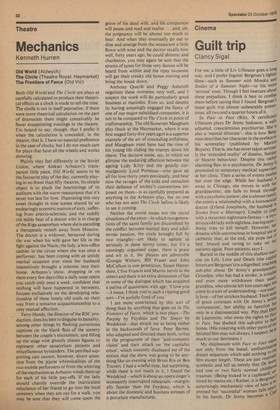Theatre
Mechanics
Kenneth Hurren
Old World (Aldwych) The Circle (Theatre Royal, Haymarket) The Frontiers of Farce (Old Vic) Both Old World and The Circle are plays as carefully calculated to produce their theatrical effects as a clock is made to tell the time. The simile is not in itself pejorative: if there were more theatrical calculation on the part of dramatists there might conceivably be fewer exasperating evenings in the theatre. I'm bound to say, though, that I prefer it when the calculation is concealed; in the theatre, that is. I have no especial preference in the case of clocks, but I do not much care for plays that have all the wheels and works showing.
Plainly they feel differently in the Soviet Union, where Aleksei Arbuzov's transparent little piece, Old World, seems to be the favourite play of the day, currently playing in no fewer than fifty theatres. Its simple object is to pluck the heartstrings of its auditors with the warm reassurance that it's never too late for love, illustrating this very sweet thought in nine scenes shared by an endearingly eccentric matron of sixty, suffering from arterio-sclerosis, and the cuddly old teddy bear of a doctor who is in charge of the Riga sanatorium where she is spending a therapeutic month away from Moscow. The doctor is a widower, bereaved during the war when his wife gave her life in the fight against the Nazis; the lady, a box-office cashier in the circus where she was once a performer, has been coping with an untidy marital situation ever since her husband insensitively brought a mistress into their home. Arbuzov's show, dropping in on them every few days (like a daily soap opera you catch only once a week, confident that nothing will have happened in between). focuses exclusively on the developing relationship of these lonely old souls on their way from a tentative acquaintanceship to a cosy mutual affection.
Terry Hands, the director of the RSC production, does his best to disguise its banality, among other things by flashing portentous captions on the blank flats of the scenery between the couple's encounters, and filling up the stage with ghostly plaster figures to represent other sanatorium patients and miscellaneous bystanders. The petrified supporting cast cannot, however, divert attention from the jejune whimsicalities of the two mobile performers or from the whirring of the mechanism as Arbuzov winds them up for each of his little pay-offs. If the lady should chattily override the inarticulate reluctance of her friend to go into the local cemetery when they are out for a walk, you may be sure that they will come upon the grave of his dead wife, and his companion will pause and read and realise. . . and, oh, the poignancy will be almost too much to bear. And when they eventually go out to dine and emerge from the restaurant a little flown with wine and the doctor recalls how well, forty years ago, he could shimmy and charleston, you may again be sure that the strains of tunes for those very dances will be heard from within and the tipsy twosome will get their creaky old bones moving and bring the house down.
Anthony Quayle and Peggy Ashcroft negotiate these moments very well, and I suspect the work will do particularly good business at matinees. Even so, and despite its having amusingly engaged the fancy of one of our major subsidised companies, it is not to be compared to The Circle in point of craftsmanship. The old Somerset Maugham play (back at the Haymarket, where it was first staged forty-five years ago) is a superior example of the art of concealing artfulness, and Maugham must have had the time of his young life sliding the trumps down his sleeve. The decisive scene, say, in which we glimpse the enduring affection between the ageing Lady Kitty and the goutily curmudgeonly Lord Porteous—who gave up all for love thirty years previously, and bear now the ravages of the exile and ostracism their defiance of society's conventions imposed on them—is as carefully prepared as anything in the Arbuzov play, but no one who has not seen The Circle before is likely to see it coming.
Neither the moral issues nor the social situations of the piece—in which two generations of the same family are discomfited by the conflict between marital duty and adulterous passion, the circle brought full by two triangles--are likely to agitate us seriously in these sporty times; but it's a cunningly organised caper, there is grace and wit in it, the players are admirable (Googie Withers, Bill Fraser and John McCallum in one generation, Susan Hampshire, Clive Francis and Martin Jarvis in the other) and there is an extra dimension of fun in some of the dialogue which has acquired a patina of quaintness with age: 'I love you —i mean, I think you're such a ripping good sort—I'm awfully fond of you.'
I am more entertained by this sort of thing than by anything that goes on in The Frontiers of Farce, which is two plays—The Purging by Feydeau and The Singer by Wedekind—that struck me as being rather in the backwoods of farce. Peter Barnes, who adapted and directed them both, writes in the programme of their 'anti-romantic vision' and their attack on 'the capitalist ethos', which instantly disabused me of the notion that the show was going to be anything like an evening with Brian Rix or Ben Travers. I had a woeful time, but surprising, while there is not much in it, I found the Wedekind—which is about an opera singer's incessantly interrupted rehearsals—marginally funnier than the Feydeau, which is about the domestic and business stresses of a porcelain manufacturer.










































 Previous page
Previous page